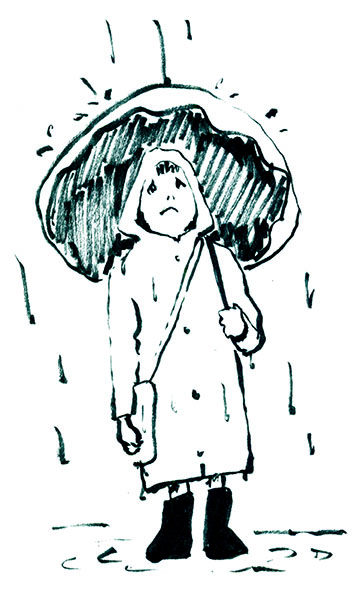Students avoiding the outdoor world, or feeling unexplained sorrow, may be experiencing seasonal affective disorder, or depression with seasonal patterns. It is more commonly found in northern regions.
Northern regions have less sunlight during winter months. This increases the likelihood of depression with seasonal patterns.
“A lot of students are more north than where they might have grown up, and the more north you go, the more likely you will find S.A.D.,” said Dr. Mimi Bommersbach, licensed psychologist at Chico State’s Counseling and Wellness Center.
The effects of depression with seasonal patterns is most certainly not limited to students from southern California. Seasonal changes are hard on all people alike: students, faculty, neighbors and the community.
It is reported in America that 4-6 percent of the population actually struggles with seasonal affective disorder, according to the American Academy of Family Physicians.
One of the most conclusive contributors to S.A.D are individuals’ circadian rhythms, said Bommersbach. Circadian rhythms are behavioral and physical patterns determined by the 24-hour clock, determined by the setting and rising of the sun. Changes in light exposure can affect moods. Less light exposure can mean a disturbance in your own circadian rhythm, or biological clock.
“It’s hard to say if the winter months are related to the students seeking counseling,” said Bommersbach.
There are other stress triggers for students. During October, there are midterms. During December, there are finals.
The Counseling Center does see an influx in student visits, but the rain may just be in correlation with the scheduled dreaded tests, rather than the cause, she said.
The winter months also appear to be a time of less socialization for people. This can cause feelings of cabin fever to occur, which in turn leads to increased feelings of laziness, and feeling less productive in general, according to the AAFP.
The cold weather and rain that comes with the winter months actually demands a significantly increased amount of energy from people. This increased energy expenditure means individuals may be more tired than during warmer months.
This is not good for college students, seeing that sleep patterns are already erratic due to changing class schedules, late-night escapades with friends and caffeinated study binges.
Bommersbach urges people prone to depressive moods, or even people who are experiencing new depressive moods based on the habitat around them, to surround themselves with positive people who encourage them to take part in self-care activities.
Some activities include taking a walk around town or through the park where exposure to light is guaranteed. Cloudy days even provide sunlight, though it is less prevalent.
Dr. Bommersbach also encourages people that were experiencing new moods of depression to try to maintain a set schedule in regards to their sleep. Though difficult, it can make a huge difference if an individual gets eight hours of sleep, and go to bed and wake up at the same time every day.
To combat negative emotions, one should try to exercise more, surround oneself with positive people, sleep soundly, get light exposure (which can be achieved with a 100 lux light box) and have a healthy diet with plenty of omega-3 and fish oil. She also stated that students should seek counseling if the depressive moods are overwhelming.
It is hard for one who is down to do the things they should to combat said emotions by themselves. The Counseling Center provides support for everyone, includes a “zen den” and council on many different personal struggles. And, it is free.
Casey Hulls can be reached at orionnewseditor@gmail.com or @mshulls on Twitter.






Bernie Kuhn // Jan 29, 2016 at 1:05 pm
I read your article thoroughly, Casey, and I found it informative, interesting and constructive. What more could I ask ? It seemed like your English construction and grammar were perfectly good and you wasted few, if any words, which are positive attributes.
The only thing I would criticize was your separation of every sentence into a paragraph format. That was a little tiresome, when you could have assembled groups of thoughts or focus into separate, corresponding paragraphs of a few sentences each.
I would say well done, overall, and I hope you or someone will send me more of your compositions. It looks to me as though you are good at expressing yourself in writing, and I suggest that you keep on practicing for fun or gain.
I hope that you are enjoying college and I wish you well.
Sincerely,
Bernie Kuhn (an adopted uncle or pup-up ? )
Sandra // Jan 27, 2016 at 11:46 pm
Thank you for the great article! Now at least I know why I just can’t wait for the summer…I want to feel happy again.